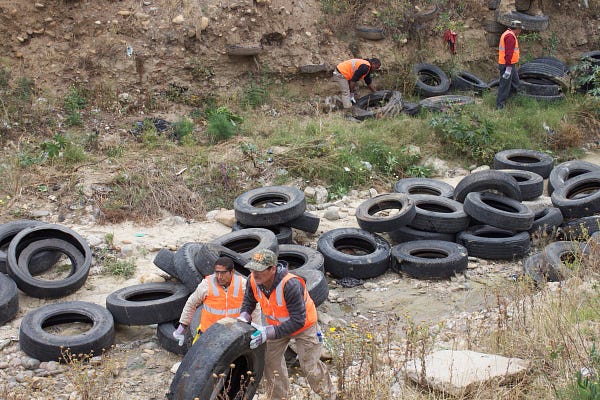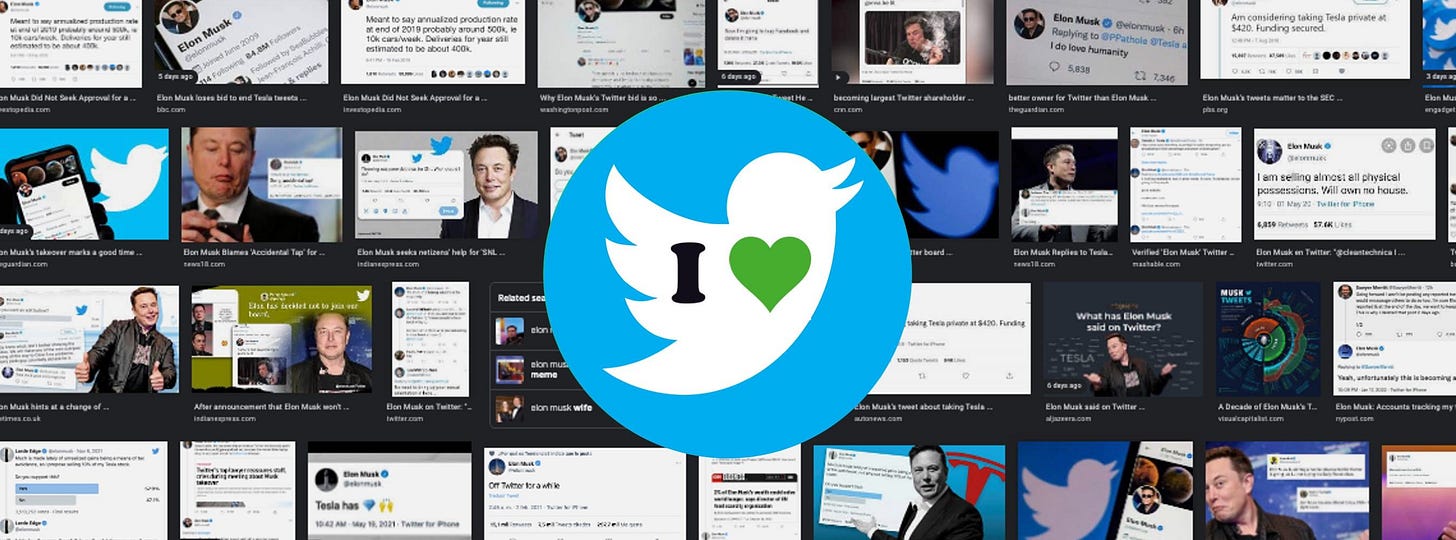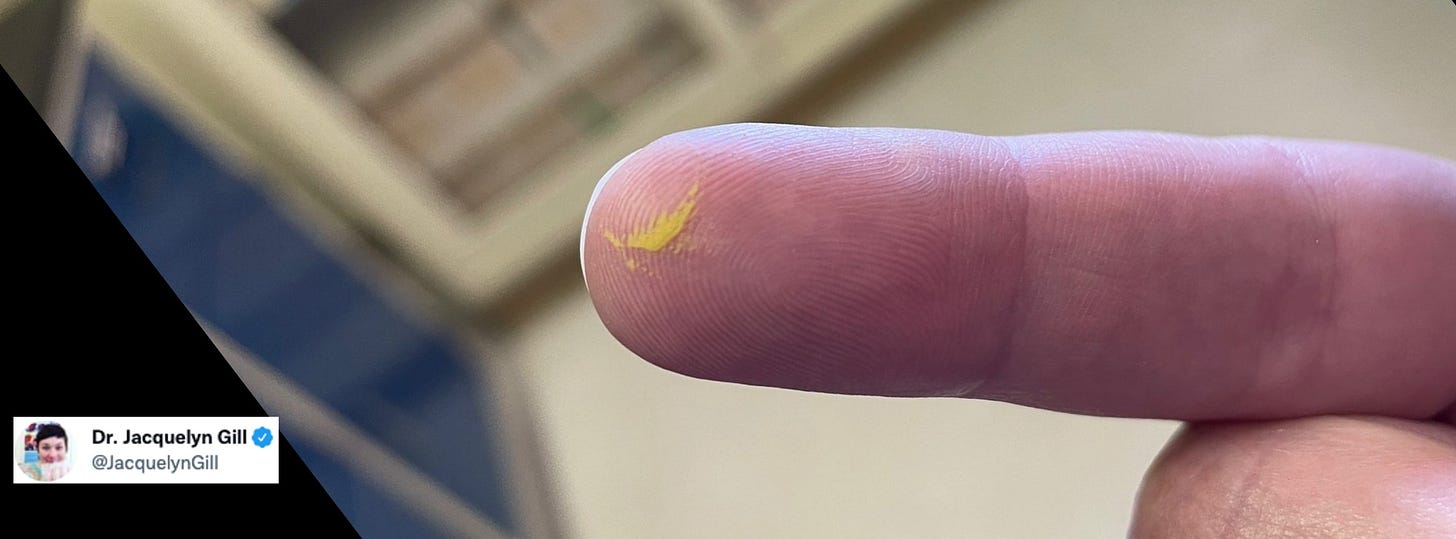Enough About Elon and X - Here's How You Can "Own" Twitter
I feel no different today with Musk's purchase of Twitter than I did when I first wrote this in May. Own it!
Let's grow this project together. Please ask a friend to subscribe to receive my posts by email (content always free so those who need it most can get it).
New post 10/31 - Even With Blue Checks for Cash, I'm Still Sticking with Twitter
UPDATED 10/27/22 - Yes, Elon Musk has bought Twitter and is cleaning house.
When news of his effort broke last spring, like others, I saw some followers at @revkin drop out as some people fled the platform fearing all manner of horrible outcome, or just loathing some of the traits of this mercurial genius.
A zillion words have been written and tweeted and traded about what this means, for better or worse.
At the Met Gala in early May, Musk said he wants to make the platform "as broadly inclusive as possible," adding, "ideally most of America is on it and talking and facilitating discussion between people and sharing ideas and content and creative things." He added that, should the deal go through, he'd also work hard to "get rid of the bots and trolls."
Here's hoping.
My prime take is very much in line with that of Tressie McMillan Cottom (@tressiemcphd), a cultural critic and sociologist at the University of North Carolina. No matter who owns it, she wrote in her latest New York Times column, "Twitter’s significance is not about revenue or advertising platforms or new features. It is about communities that create ideas."
I'd say that works in reverse, as well. The exploration of ideas on Twitter, particularly - more than any other digital crossroads - can create communities that would never otherwise form. In the long haul, with work, that capacity can propel innovation, empathy, even friendships more than the opposite.
It does take work, and practice, but you can come to own Twitter - to have it serve you and your goals for this planet and communities at every scale.
With or without Musk, I'm more firmly a Twitter enthusiast than ever, unless (and until) he does some really foolish things to this communication portal.
But I'd love to know your thoughts.
The downside is truly poisonous. But there are steps anyone can take to limit harm to you or others while pursuing the positive. Please see PEN America's Online Harassment Field Manual for starters, and my Sustain What webcast with PEN and some tweeting scientists for ideas.
Here are seven ways Twitter can help build the capacity for borderless collaboration, critical thinking, discovery, wonder, laughter and even physical community resilience and safety.
These are just some of the reasons why I'll keep devoting a few hours a day (yes~..) to tracking and engaging in conversations and information flows there.
I'll keep sharing the best insights here so you don't have to replicate that time investment.
If you're an enthusiast, let me know why. If you avoid Twitter or have dropped out, do the same. And, yes, let's talk about Facebook and Instagram down the line.
1. Engagement pathway
There are some people on Twitter who have wonderfully refined its capacity to engage people with the fruits of curiosity and open learning. One of my favorite practitioners is Jacquelyn Gill (@JacquelynGill), associate professor of paleoecology and plant ecology at the University of Maine and co-founder of the Warm Regards podcast. This Twitter thread is a marvelous example, starting with this moment:

Here's Gill's pollen sampling device.
You can guess where this goes! Here are some images from the resulting thread:
2. Blind spot and bias detector
This attribute of Twitter requires humility.
In 2020, I saw Blake Morgan (@blakemichellem) post her Forbes article on "50 leading female #futurists: @amywebb @MareeConway @FuturesWise @alexandra4casts @cecilysommers @climatefuture @elinafuturist @futuristufuk @FaithPopcorn @kjaerglobal @GayemarieBrown @hauspa @proGective @Urbanverse @amyzalman @MadelineAshby @ErOrange."
I asked this in reply:
That resulted in two valuable tracks of responses.
Amy Zalman (@amyzalman), a futurist at Georgetown University, said my focus on differences related to gender and geography left out a more important factor - power:
Other respondents appropriately challenged my presumption that the field is dominated by white males. That's a bias that, I think, comes from a few super-high-profile analysts like Nassim Taleb.(@nntaleb).
Anab Jain (@anabjain), a co-founder of the design firm and consultancy Superflux, wrote:
"Most women (of colour) who practice futures that I know don't want to 'occupy the space' but instead make room."
Point gratefully taken!
Susan Cox-Smith (@hauspa) of Changeist said, "The field is not too white male dominated if you try even a little bit." She was right. I had her on a great Sustain What webcast on "hope and sense-making during a pandemic" with the author Thomas Homer-Dixon and Michael Garfield of Long Now Foundation.
It was through that look for futurists that I found Katindi Sivi-Njonjo,(@katindisivi), a founder of LongView Consult in Nairobi. She has greatly enriched a host of Sustain What conversations since and I'm eager to help advance her goal of building a foresight lab for African youth. Learn more about her work in this climate conversation with Malala Yousafzai and the youth activist Xiye Bastide.
3. Twitter as answer provider and question refiner
a. Use Twitter like a search engine. Even without hashtags like #climatetwitter or #energytwitter, Twitter can serve as a fantastic basic resource for exploring and refining, more than answering, tough questions. I encourage you to search Twitter like you would Google - using terms that best define your specific question.
Wikipedia or Google can lead you to facts, but less easily to experts or people with a fresh vantage point who can refine or even up-end your question.
b. Ask Twitter a question. Genevieve Guenther (@doctorvive), the founder of End Climate Silence, is a master at this. Here she just hailed one result:
"#Twitter can be awful, sure, but where else can you ask a question like this, go out for a run, and come back to clear and concise answers from some of the world's top experts?"
Here's what Guenther asked (and do explore the thread for great answers):

The climate scientist Andrew Dessler (@andrewdessler) spurred an absolutely fantastic, iterative conversation with this question:

Please explore the conversation and let me know your thoughts.
4. Rough-edge grinder (with patience)
Twitter can be abused savagely. But, with work and patience, can be used to build the best kinds of relationships - those won through sustained, civil engagement.
Guenther, who's writing a book on the language of climate politics, has a passionate and reasoned focus on rapid, global, deep decarbonization. We have disagreed pretty vehemently on some aspects of this; I see the profound societal harms from big energy gaps in poor countries as justifying continued fossil fuel use in such places (especially because these same populations have contributed nil to global heating).
But we agree profoundly on the need for clear language and accountability in climate and energy discourse. Nearly all of our intellectual relationship developed first through Twitter exchanges. We met face to face in a Manhattan sushi bar just before the pandemic. Guenther has come on several of my Sustain What shows. I think she'd agree we've become friends, and look forward to meeting up with her again face to face.
Here's one unforgettable shared moment that wouldn't have happened without the initial Twitter connection; watch for the reactions of Guenther and the poet and essayist Andrei Codrescu as my friend Reggie Harris finishes his song written during the George Floyd days:
5. Twitter as life saver - really
I've long seen fantastic potential in Twitter (and in this case other social media) as a two-way sensory apparatus, allowing communities, for example, to highlight where standing water might be a breeding ground for the mosquitoes carrying Dengue fever or Zika virus:
Serge Dedina (@Serge4IBMayor), than as now the mayor of Imperial Beach, California, embraced the notion:


But the capacity for life-saving communication using Twitter is vastly more advanced than this, as was described in a seminar on harnessing Twitter dynamics for community resilience, hosted by Jennifer Marlon (@JMarlonPhD) of the Yale Program on Climate Change Communication and featuring Jim Moffitt (@snowman). Moffitt is a staff engineer on the Developer Relations team at Twitter who previously developed software for real-time weather monitoring and flood-warning systems. He walked through a host of examples showing how programmers have, and can, harness the distributed real-time posts of citizens to shape emergency response and more.
Here's the video, which I encourage you to watch when time allows.
But also make sure to explore the page of links Moffitt shared: Listening to Twitter Conversations: Floods, Extreme Weather, and Climate Change.
Here are two links to flood early-warning systems that have integrated the Twitter API (application programming interface):
He also pointed to a page where researchers or practitioners in emergency warning and response can see examples using Twitter activity to track extreme weather:
I found the Indonesian project, called PetaBencana.id, particularly exciting. As the program website explains, "PetaBencana.id provides residents, government agencies, and first responders with a real-time disaster information sharing system at an unprecedented scale. It is the first platform of its kind to harness the power of crowdsourcing through social media to aid humanitarian response and recovery." This video nicely illustrates how this works:


I'm in touch with Moffitt about running a Sustain What conversation (or two or three) focused on ways to spread such capacities, so stay tuned. His work is very much in sync with the United Nations' goal of spreading extreme-weather early warnings worldwide.
6. Portal to wonder
Rebecca Helm (@rebeccarhelm), a professor at the University of North Carolina, Asheville, has built a well-deserved following for spreading the wonders of floating ocean life, as in this mind-blowing thread:

7. Chuckle provider
@TheTweetofGod is a priceless cure for whatever ails you, as here:
This all really just scratches the surface. For more, read the many New York Times posts I wrote on why and how 140 characters can matter (in the days before the doubling) offering insights learned since my single exploratory tweet in the first year of the platform, 2007:
Resources
How to Defend Yourself (or Others) Against Online Attacks
Thriving Online: @Sree Sreenivasan on Building Savvy Social Media Skills
Talking Twitter and the Web with Hashtag Inventor Chris Messina, David Weinberger and Margaret Rubega:












Great article with loads of reasons to take some time with Twitter (which I have typically avoided as being just another social media network)-- thanks for enlightening me!
To each their own is a good rule, but personally, I've never been a Twitter fan, ever since the beginning. I think it was a mistake for intelligent people to abandon forums for any form of social media.
A bit of background: I began working online in 1995, and built one of the first emailed newsletter services, which I later sold for a tidy sum to a big company. Then I spent years coding my own forum network and blog network platform software from scratch, and too many websites to ever possibly remember. Point being, I've had some time to think about all this.
Social media is great for the average person who wants to share photos of their dog and engage in random chit chat with friends and family. There's real value there, for those folks. But social media was specifically designed to discourage, and even prevent, the kind of in depth ongoing conversations that intelligent people, especially those who do it for a living, should be using the net for. I do have a Twitter account today, but only because Substack allows me to post links to my new articles on Twitter with exactly no effort. Same for Facebook.
I was hoping Musk might manage to kill Twitter with his incompetent drama queen antics, but that's probably a fantasy.
I know this isn't going to happen, but my dream would be replacing Twitter with a single discussion forum designed specifically for intelligent people. No ads. No algos. No wacko billionaires. No twerps and trolls. Invitation only. In depth conversations. I tried to build just such a place, but everyone is addicted to blasting out clever little tweets on their phone these days, so I faced reality, and let it go.
From my perspective, as far as intelligent dialog goes, the net is in a process of decline. I'm encouraged by Substack, and blog comments are a good compromise. But we already had the best platform for intelligent discussion, forums, and we threw it away.
What's coming in the future is that all social media content will be reduced to the word "me". But then people will complain that's too verbose, takes too much time to type and read, and is hard to submit from an Apple watch, so those two characters will be cut in half to the letter "I".